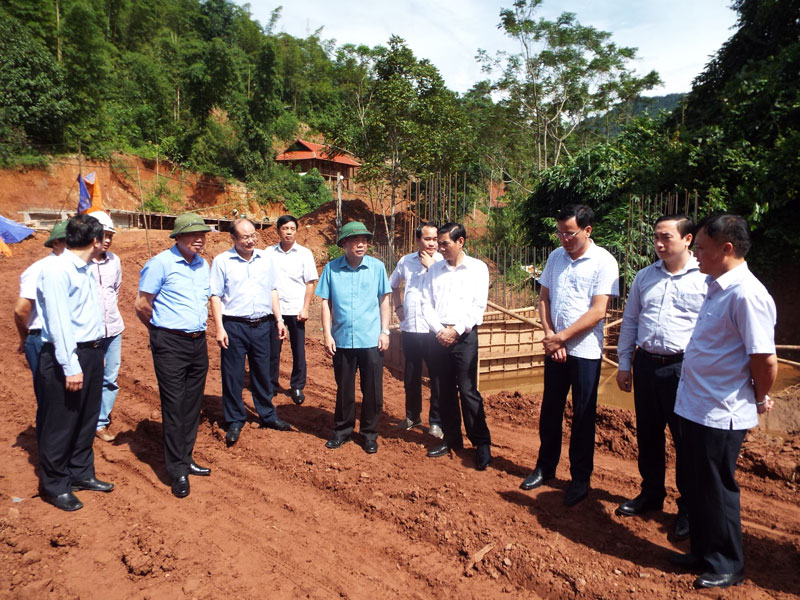
(HBO) – In the morning of August 21, Vice Secretary of the Hoa Binh Party Committee and Chairman of the provincial People’s Committee Nguyen Van Quang inspected the building of the Cun Pheo - Hang Kia - National High Way No.6 road.

Chairman of the provincial
People’s Committee Nguyen Van Quang examines the project.
The construction of the route began in October 2016 at a total
cost of 80 billion VND. Funding for the project is sourced from the national
budget earmarked for a programme on supporting local socio-economic development.
The project has to date completed its subgrade, with investment
and spending amounting to 25 billion VND. Due to capital difficulty, the main
investor – the Mai Chau district People’s Committee – asked relevant agencies
to reschedule the project into two phases.
Accordingly, the first phase is set to disburse a budget of 54
billion VND until 2020 to build a drainage system as well as different base levels
for the formation of a concrete surface. The second phase, with a funding worth
26 billion VND, completes the remaining subgrade of the road.
The construction of the road has encountered downpours, which caused
landslides and hindered traffic flow. The Mai Chau district People’s Committee
proposed the provincial authorities channel more capital into the project so
that the road will soon be fully operational.
Checking on the construction progress of the project and taking
note of proposals by the committee, Chairman of the provincial People’s
Committee Nguyen Van Quang directed relevant units to consider injecting an
addition of 26 billion VND into the project. The Mai Chau People’s Committee
was tasked with joining relevant agencies to direct the allocation of human
resources and equipment following regulations.
The Standing Board of the Hoa Binh provincial Party Committee has agreed in principle on a proposal by the Standing Board of the Party Committee of Hoa Binh city to gather feedback on the city’s 1:2000 zoning plan, which forms part of its broader urban development strategy.
Hoa Binh province has made notable progress in public administration reform and digital government development, with the satisfaction index among citizens and businesses reaching over 84%, according to recent government evaluations.
Thanks to great efforts by local authorities in recent times, the governance and public administration performance of Mai Chau district has been significantly improved.
In the afternoon of June 6, the Party Committee, the People's Council, the People's Committee and the Fatherland Front of Lac Son district solemnly held a meeting to celebrate the 139th anniversary of the district's founding (1886–2025) and the 79th anniversary of the establishment of the district's Party Committee (1946–2025). There was the attendance of Mr. Bui Van Thang, the Vice Chairman of the Provincial People's Council; Mr. Quach Tat Liem, the Vice Chairman of the Provincial People's Committee; Ms. Dang Bich Ngoc, the Deputy Head of the National Assembly Delegation of the province; as well as the former leaders of the province and district through various periods, who are the natives of the district.
Implementing the Politburo’s Resolution No. 57-NQ/TW on breakthroughs in science – technology, innovation, and digital transformation is a golden opportunity for the northern mountainous province of Hoa Binh to renew growth model, improve competitive edge and shorten digital gap.
Resolution 57-NQ/TW, issued by the Politburo on December 22, 2024, identifies sci-tech, innovation, and digital transformation as strategic breakthroughs to build a developed and prosperous nation. In Hoa Binh province, this spirit is not just a slogan, it’s being put into action through concrete initiatives that form a "new development triangle”: digital citizenship, digital economy, and digital administration.



